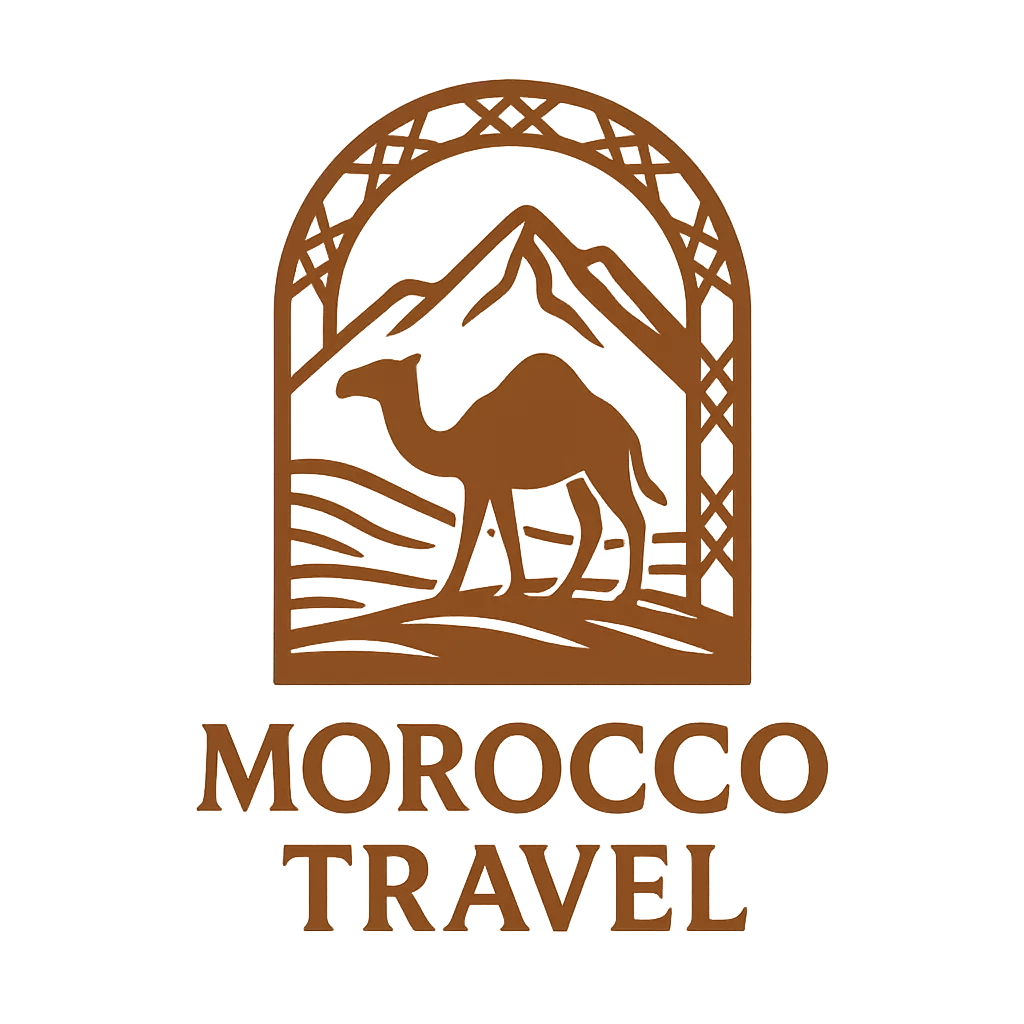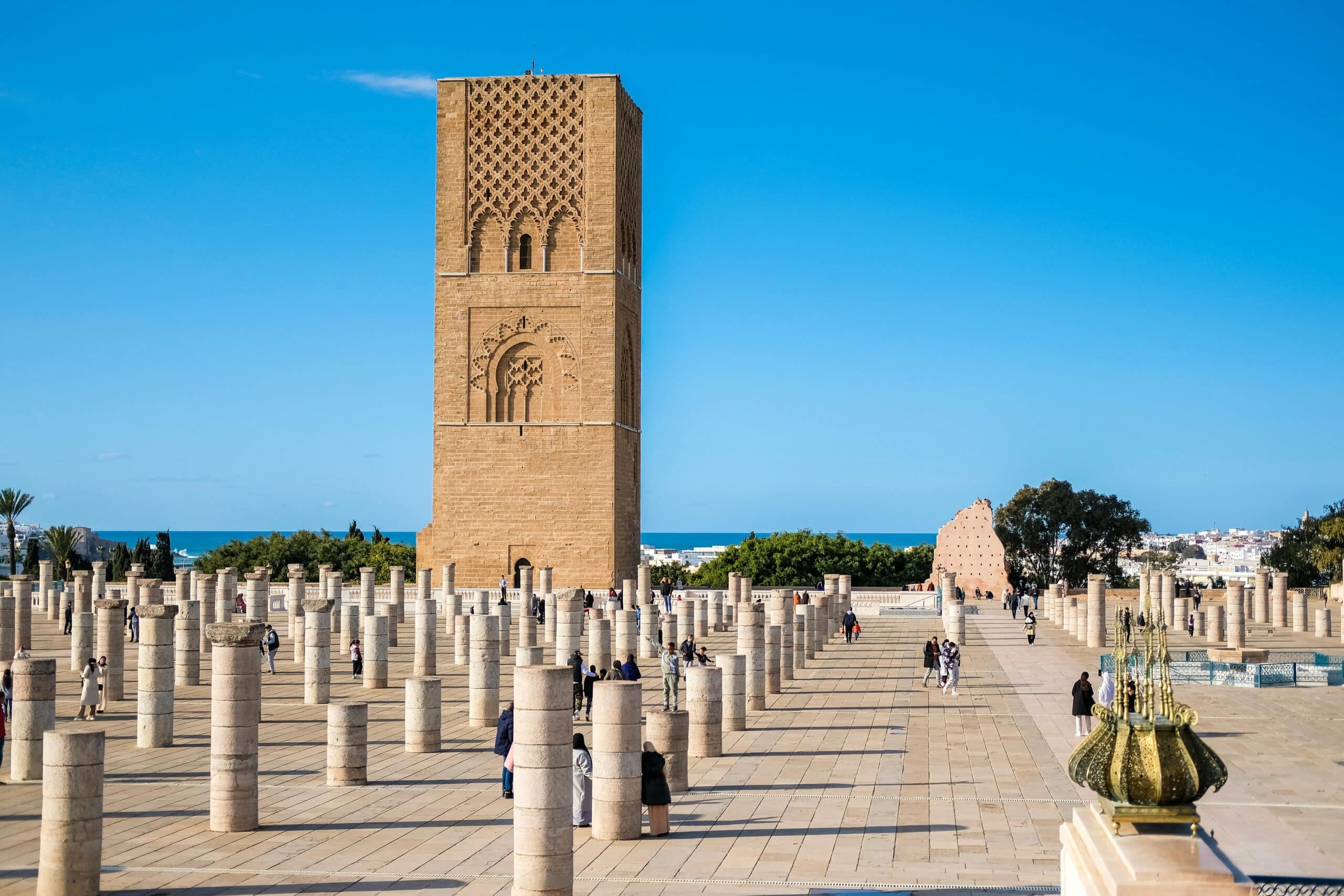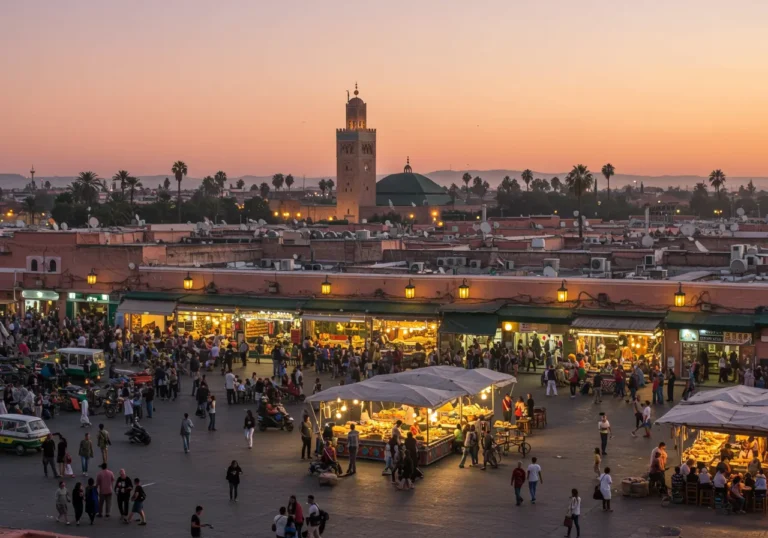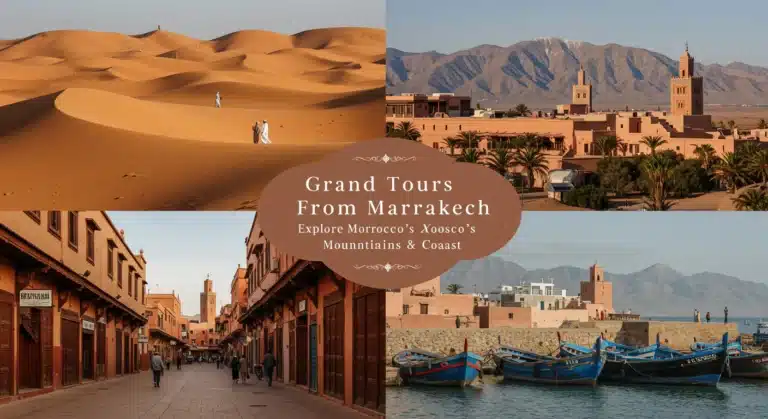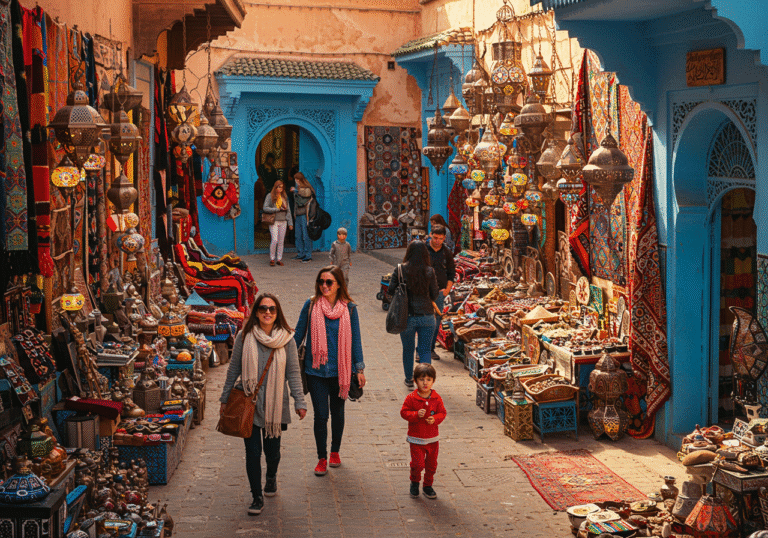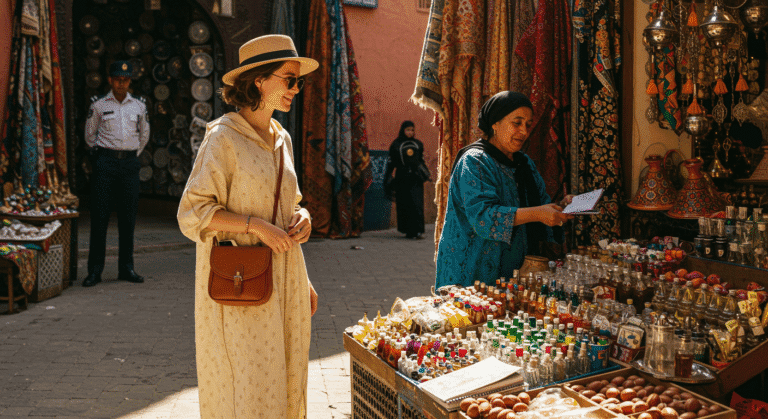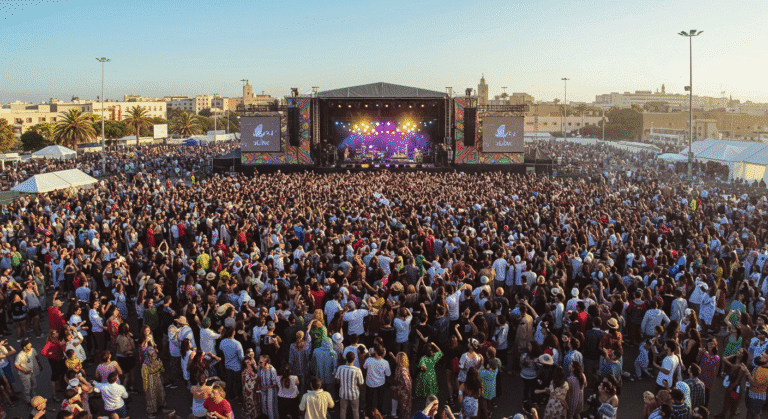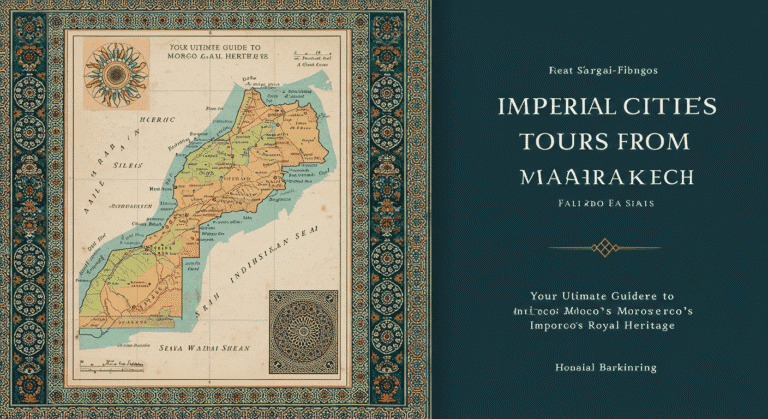Top Things to Do in Rabat in 2025
While Marrakech dazzles with its chaos and Fez enchants with its medieval charm, Rabat offers something entirely different – the sophisticated soul of modern Morocco. As the capital de Marruecos, this elegant city in Morocco seamlessly blends imperial grandeur with contemporary culture, creating an experience that feels both authentically Moroccan and refreshingly cosmopolitan. From the majestic Hassan Tower to the tranquil Andalusian Gardens, Rabat reveals why it’s considered North Africa’s most underrated cultural treasure.
Overview: What Makes Rabat Special in 2025
Rabat stands as Morocco’s political and cultural heart, where ancient history meets modern governance. This Maroc city of 1.2 million inhabitants serves as the kingdom’s administrative center while maintaining an atmosphere of refined elegance that distinguishes it from other major Moroccan destinations.
Unlike the tourist-heavy medinas of Marrakech or Fez, the Rabat medina offers an authentic glimpse into daily Moroccan life. Here, you’ll find government officials grabbing lunch alongside traditional craftsmen, and modern art galleries nestled between centuries-old riads.
What Sets Rabat Apart:
- UNESCO World Heritage status for its outstanding universal value
- Home to Morocco’s royal palaces and governmental institutions
- Exceptional museums showcasing Moroccan and international art
- Pristine Atlantic coastline with beautiful beaches
- Remarkably clean and well-organized compared to other Moroccan cities
Key Statistics for 2025:
- Population: 1.2 million in greater Rabat-Salé area
- Average Temperature: 18°C (64°F) year-round
- Medina Size: Compact and walkable in 2-3 hours
- Tourist Density: Significantly lower than Marrakech or Fez
Best Time to Visit the Capital
Rabat enjoys one of Morocco’s most pleasant climates, making it an ideal year-round destination. However, certain seasons offer distinct advantages for different types of travelers.
Spring (March-May): Peak Cultural Season Perfect weather combines with cultural events like the Mawazine Music Festival (typically May), when international artists perform alongside Moroccan musicians. Garden enthusiasts will find the Andalusian Gardens and Chellah ruins at their most spectacular.
Summer (June-August): Coastal Comfort While inland Morocco swelters, Rabat’s Atlantic location provides cooling breezes. Beach activities at Plage de Rabat become attractive, though this is peak Moroccan vacation season.
Autumn (September-November): Ideal Balance My personal favorite time to visit – fewer crowds, comfortable temperatures, and the city’s academic season brings vibrant energy to cafés and cultural venues.
Winter (December-February): Contemplative Exploration Mild temperatures perfect for museum visits and medina wandering. Occasional rain enhances the city’s gardens and creates dramatic skies over the Atlantic.
Cultural Calendar Highlights:
- Mawazine Festival: Major international music festival (May)
- Rabat Festival of Lights: Illuminates historic monuments (December)
- International Film Festival: Showcases African cinema (November)
- Ramadan Atmosphere: Unique iftar experiences in the medina
Essential Local Tips & Cultural Etiquette
Rabat’s status as Morocco’s capital brings unique cultural dynamics that enhance your visit when properly understood.
Governmental District Protocol:
- Royal Palace Area: Photography restrictions near government buildings
- Dress Code: More conservative than tourist cities – business casual recommended
- Friday Prayers: Expect brief service interruptions around noon
Language Advantages:
- French Prevalence: Higher French fluency due to diplomatic community
- Arabic Dialects: Standard Arabic more common in official settings
- English Usage: Growing among younger professionals and museum staff
Social Dynamics:
- Café Culture: Intellectual discussions common in university quarter cafés
- Business Hours: Government influence means stricter adherence to official hours
- Tipping Standards: 10-15% in restaurants, 5-10 dirhams for guides
Practical Considerations:
- Traffic Patterns: Rush hours coincide with government schedules (8-9 AM, 5-6 PM)
- Weekend Rhythms: Friday-Saturday weekend affects museum and attraction schedules
- Security: Heightened but discreet security presence due to governmental importance
Must-See Attractions & Hidden Gems
Historic Monuments
Hassan Tower & Mausoleum of Mohammed V No visit to Rabat is complete without experiencing this architectural masterpiece. The Hassan Rabat complex represents Morocco’s most important national monument, where the unfinished minaret of the 12th-century Hassan Mosque stands beside the elaborate mausoleum of modern Morocco’s founder.
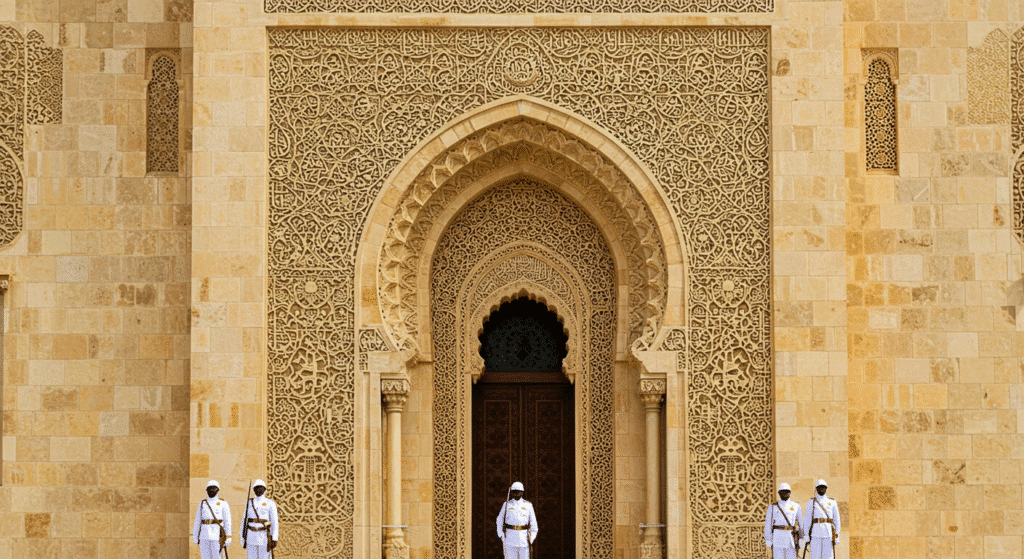
Insider Tip: Visit during the changing of the guard ceremony (hourly during daylight) for a glimpse of royal protocol in action.
Chellah Necropolis This ancient Roman and medieval Islamic site offers Rabat’s most romantic setting. Storks nest atop crumbling minarets while cats roam through Roman ruins overgrown with wildflowers. The combination of archaeological significance and natural beauty creates an almost mystical atmosphere.
Cultural Treasures
Mohammed VI Museum of Modern & Contemporary Art Africa’s most impressive modern art museum showcases the evolution of Moroccan artistic expression alongside international contemporary works. The building itself – a masterpiece of modern Moroccan architecture – deserves as much attention as its collections.
Archaeological Museum Home to Morocco’s most significant prehistoric and Roman artifacts, including the famous Volubilis bronzes. The museum’s intimate scale allows for meaningful engagement with each piece.
Medina Discoveries
Rabat Medina: The Authentic Experience Unlike tourist-focused medinas elsewhere, Rabat’s old city functions as a living neighborhood. Traditional craftsmen work alongside modern shops, and local residents outnumber visitors by vast margins.
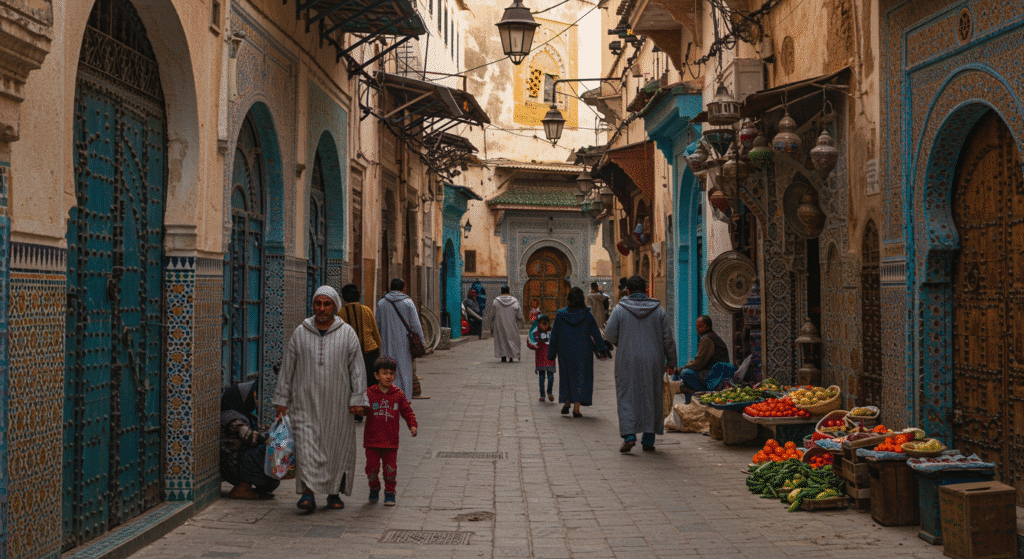
Hidden Gem – Rue des Consuls: This narrow street houses traditional leather workers, woodcarvers, and textile merchants who welcome visitors into their workshops. The absence of aggressive selling creates space for genuine cultural exchange.
Coastal Attractions
Kasbah of the Udayas Perched dramatically above the Atlantic, this 12th-century fortress offers breathtaking ocean views and houses some of Morocco’s most beautiful examples of Andalusian architecture and gardens.
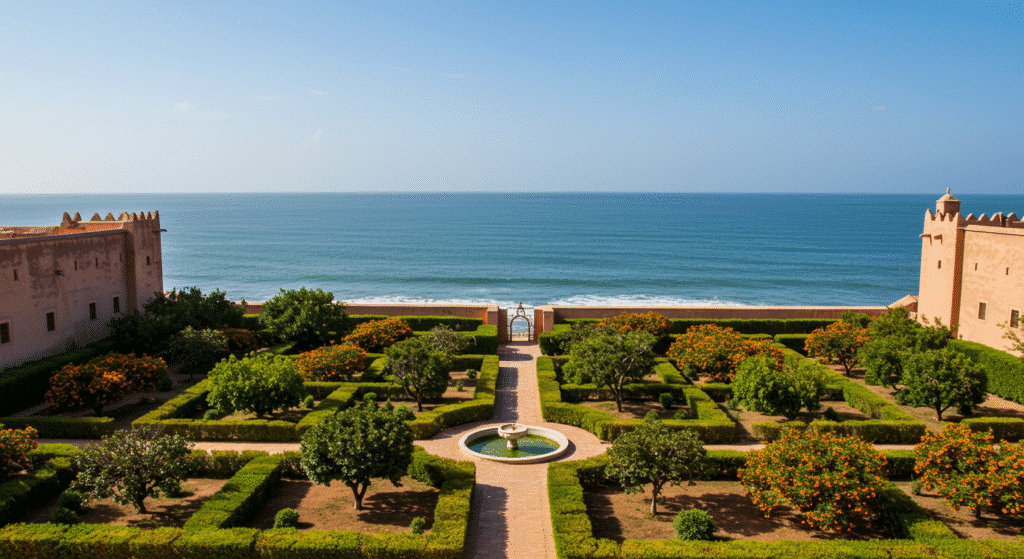
Plage de Rabat The city’s main beach provides excellent surfing conditions and beachfront dining. The contrast between urban sophistication and natural Atlantic beauty epitomizes Rabat’s unique character.
Contemporary Discoveries
Agdal District Modern Rabat’s commercial heart showcases contemporary Moroccan urban development. The tree-lined boulevards, modern shopping centers, and international restaurants demonstrate the capital’s cosmopolitan character.
Hay Riad Cultural Quarter This emerging neighborhood features contemporary art galleries, designer boutiques, and innovative restaurants that represent modern Moroccan creativity.
Transportation & Accommodation Guide
Getting There
Mohammed V International Airport (Casablanca):
- Train Connection: Direct service to Rabat (45 minutes, 40-50 MAD)
- Taxi Service: Approximately 300-400 MAD for private transfer
- Rental Car: Easy access via A1 highway (45-minute drive)
Domestic Connections:
- From Marrakech: High-speed train (3.5 hours, 180-220 MAD)
- From Fez: Regular train service (2.5 hours, 120-150 MAD)
- From Tangier: Coastal train route (4 hours, 150-180 MAD)
Getting Around
Rabat Tramway: Modern, efficient system connecting major attractions. Single journey costs 6 MAD, day passes available for 15 MAD.
Petit Taxis: Metered taxis for short distances within the city. Typical journeys cost 15-30 MAD.
Walking: Most attractions within the medina and ville nouvelle are easily walkable. The city’s compact size makes pedestrian exploration ideal.
Accommodation Options
Luxury Hotels:
- La Tour Hassan Palace: Historic palace hotel with royal connections (2,000-3,000 MAD/night)
- Sofitel Rabat Jardin des Roses: Modern luxury with extensive gardens (1,500-2,500 MAD/night)
Boutique Properties:
- Riad Kalaa: Traditional riad in the medina (800-1,200 MAD/night)
- Villa Mandarine: Intimate hotel with exceptional gardens (1,200-1,800 MAD/night)
Budget-Friendly Options:
- Hotel Balima: Historic downtown location (400-600 MAD/night)
- Auberge de Jeunesse: Youth hostel with shared facilities (100-150 MAD/night)
What to Pack & How to Prepare
Clothing Essentials
- Business Casual: Collared shirts and long pants for government district visits
- Comfortable Walking Shoes: Essential for medina exploration and museum visits
- Light Jacket: Atlantic breezes can be cool, especially in evening
- Modest Beachwear: For Atlantic coast activities
- Formal Option: One dressy outfit for upscale dining or cultural events
Cultural Preparation
- Basic French Phrases: More useful than in other Moroccan cities
- Government District Map: Understanding official building locations
- Museum Schedules: Many close on Tuesdays or have irregular hours
- Currency: Moroccan Dirhams (MAD), credit cards widely accepted
Health & Safety
- Sunscreen: Strong Atlantic sun reflection
- Comfortable Backpack: For day-long cultural exploration
- Water Bottle: Stay hydrated while walking
- Travel Insurance: Standard coverage sufficient for this safe city
Photography Equipment
- Wide-Angle Lens: For architectural photography
- Portable Tripod: For evening shots of illuminated monuments
- Extra Batteries: Cold ocean breezes can drain power quickly
Frequently Asked Questions
How many days should I spend exploring things to do in Rabat?
Two to three days allows thorough exploration of major attractions while experiencing the city’s relaxed pace. This timeframe covers the Hassan Tower, museums, medina, and coastal areas without rushing.
What makes Rabat different from other major cities in Morocco?
As the capital de Marruecos, Rabat offers a more refined, less touristy experience. The city combines governmental sophistication with authentic Moroccan culture, creating a unique atmosphere that’s both cosmopolitan and traditional.
Q: Are there good things to do in Rabat Morocco for beach lovers?
Absolutely! Rabat’s Atlantic location provides excellent beaches, surfing opportunities, and coastal walks. The Kasbah of the Udayas offers dramatic ocean views, while Plage de Rabat provides swimming and water sports.
How accessible are Rabat Morocco attractions for first-time visitors?
Very accessible! The city’s compact size, good public transportation, and lower tourist density make navigation easier than in Marrakech or Fez. Most major attractions are within walking distance of each other.
What’s special about the Hassan Rabat complex?
The Hassan Tower and Mausoleum of Mohammed V represent Morocco’s most important national monument. This site combines 12th-century Islamic architecture with modern royal mausoleums, symbolizing Morocco’s historical continuity.
Is Rabat suitable for cultural travelers interested in authentic experiences?
Perfect for cultural travelers! As Morocco’s capital, Rabat offers world-class museums, UNESCO World Heritage sites, and authentic medina experiences without overwhelming tourist crowds. The city provides genuine insights into both traditional and modern Moroccan culture.
